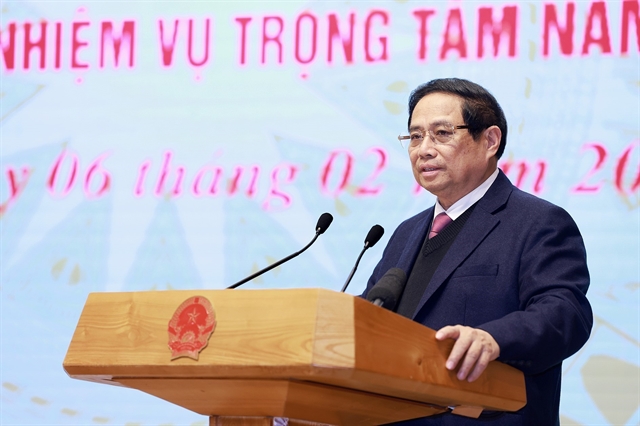 Opinion
Opinion

 |
| Prime Minister Phạm Minh Chính speaking at the meeting on Thursday. — VNA/VNS Photo Dương Giang |
HÀ NỘI — Việt Nam’s digital transformation is progressing at an unprecedented pace, with the country’s digital economy growing by over 20 per cent annually, making it the fastest-growing in Southeast Asia.
This growth was highlighted during the 10th meeting of the National Committee on Digital Transformation, chaired by Prime Minister Phạm Minh Chính on Thursday, at which Government officials reviewed the progress of the national digital strategy in 2024 and outlined key priorities for 2025.
According to the Ministry of Information and Communications, Việt Nam has risen to 71st place in the UN’s global e-government rankings, climbing 15 spots since 2022. For the first time, the country is classified among nations with a "very high" e-government development index. Significant legislative breakthroughs have helped unlock digital development, including amendments to the Telecommunications Law and the introduction of the National Data Strategy, which addresses long-standing issues related to data management and the digital economy.
Infrastructure development has also been a major focus. In 2024, Việt Nam successfully auctioned additional 5G frequency bands and launched its sixth and largest undersea cable with a 20Tbps capacity, significantly improving Internet speeds and international connectivity. With fibre optic Internet coverage now reaching 82.4 per cent of households, the country has exceeded its 2025 target of 80 per cent. Mobile broadband speeds have also increased, with Việt Nam ranking 37th globally for mobile Internet (86.96 Mbps) and 35th for fixed broadband (159.32 Mbps).
The rapid growth of the digital economy is another highlight, now accounting for an estimated 18.3 per cent of GDP. E-commerce retail sales reached US$25 billion in 2024, with Việt Nam ranking among the world's top 10 fastest-growing e-commerce markets. The adoption of cashless payments is also rising sharply, increasing by over 50 per cent annually, the highest in Southeast Asia.
 |
| Prime Minister Phạm Minh Chính and delegates pressed the button to launch the healthcare sector data coordination system. — VNA/VNS Photo |
At the National Committee on Digital Transformation meeting, PM Chính said: "Digital transformation must be closely linked to the revolution in administrative reform and improving the quality of Government officials and civil servants."
The digital transformation must take place nationwide, comprehensively, and across all sectors and levels, aligning with global development trends and meeting the people's needs, he added.
The development of science, technology and innovation is an objective necessity, a strategic choice and a top priority for fast and sustainable economic growth, to achieve a prosperous and civilised nation where people enjoy greater well-being, he noted, adding that science, technology, innovation and digital transformation must be centred around people and businesses to drive development.
PM Chính confirmed that the digital transformation must be closely tied to the restructuring and streamlining of the administrative system with acceleration and breakthroughs in five areas: a comprehensive digital transformation, integrating digital technology into all economic sectors to hit double-digit economic growth; in digitising industries, from manufacturing and agriculture to services, enhancing productivity, efficiency and competitiveness; in developing digital infrastructure; in developing a technologically capable workforce, equipping future employees with knowledge and skills to seize digital era opportunities; and in building a digital government, improving administrative efficiency and better serving people and businesses.
Efforts should focus on raising public awareness of the digital transformation through widespread and targeted communication, launching a nationwide movement, and strengthening inspection and oversight of civil servants' duties in digital transformation and public service delivery, the Government leader said.
By June 2025, all ministry and provincial leaders must conduct administrative operations and sign documents digitally. By the end of 2025, all local Government officials at commune, district and provincial levels must handle tasks digitally.
The Government will continue refining regulations, issuing policies and ensuring resources for the digital transformation, with a strong push for digital economy growth, digital infrastructure development and national digital platforms.
By the end of 2025, the Government aims to achieve 80 per cent fully online public services, with 40 per cent of adults using online public services and 100 per cent of administrative procedures linked to personal identification numbers.
The Government has pushed digital adoption through initiatives such as integrating 4,475 administrative procedures into the National Public Service Portal, allowing citizens to use the VNeID app for online transactions.
Meanwhile, digital services are expanding across sectors. Over 90 per cent of insured individuals now have electronic health records, while 100 per cent of students have digital learning profiles. The entire public healthcare and higher education systems have adopted cashless payments. The number of digital signatures issued rose by 58.61 per cent in 2024, with 12.5 million users now possessing electronic authentication. Additionally, more than 55.25 million VNeID accounts have been activated, surpassing the national target.
However, several challenges remain. The widespread adoption of digital public services is still limited, and data sharing between agencies is not yet fully integrated. Cybersecurity threats, including online fraud and transnational cybercrime, continue to escalate. Despite Việt Nam’s improvements in cybersecurity rankings – moving from 25th to 17th globally – malicious cyber activities pose a persistent risk. Moreover, digital literacy remains uneven, particularly in rural and mountainous areas, and the IT workforce is still insufficient to meet industry demands.
Looking ahead, the Government has set an ambitious digital agenda for 2025 under the theme 'Comprehensive Digital Transformation for Economic Growth'. The National Digital Transformation Committee aims to drive an 8-10 per cent GDP growth rate, focusing on digital breakthroughs across industries. With decisive policies and continued investment in digital infrastructure, Việt Nam is poised to solidify its position as a regional leader in digital transformation and economic growth. — VNS




